The Best 10 Alternatives to Proton VPN (+ Pricing & Reviews)
Twingate Team
•
•
Jul 27, 2024

Proton VPN provides secure internet connections through encrypted VPN tunnels, ensuring privacy by not logging user activity and allowing access to restricted online content. While it offers robust features, it might not be the choice for everyone. This article explores the benefits and limitations of using Proton VPN.
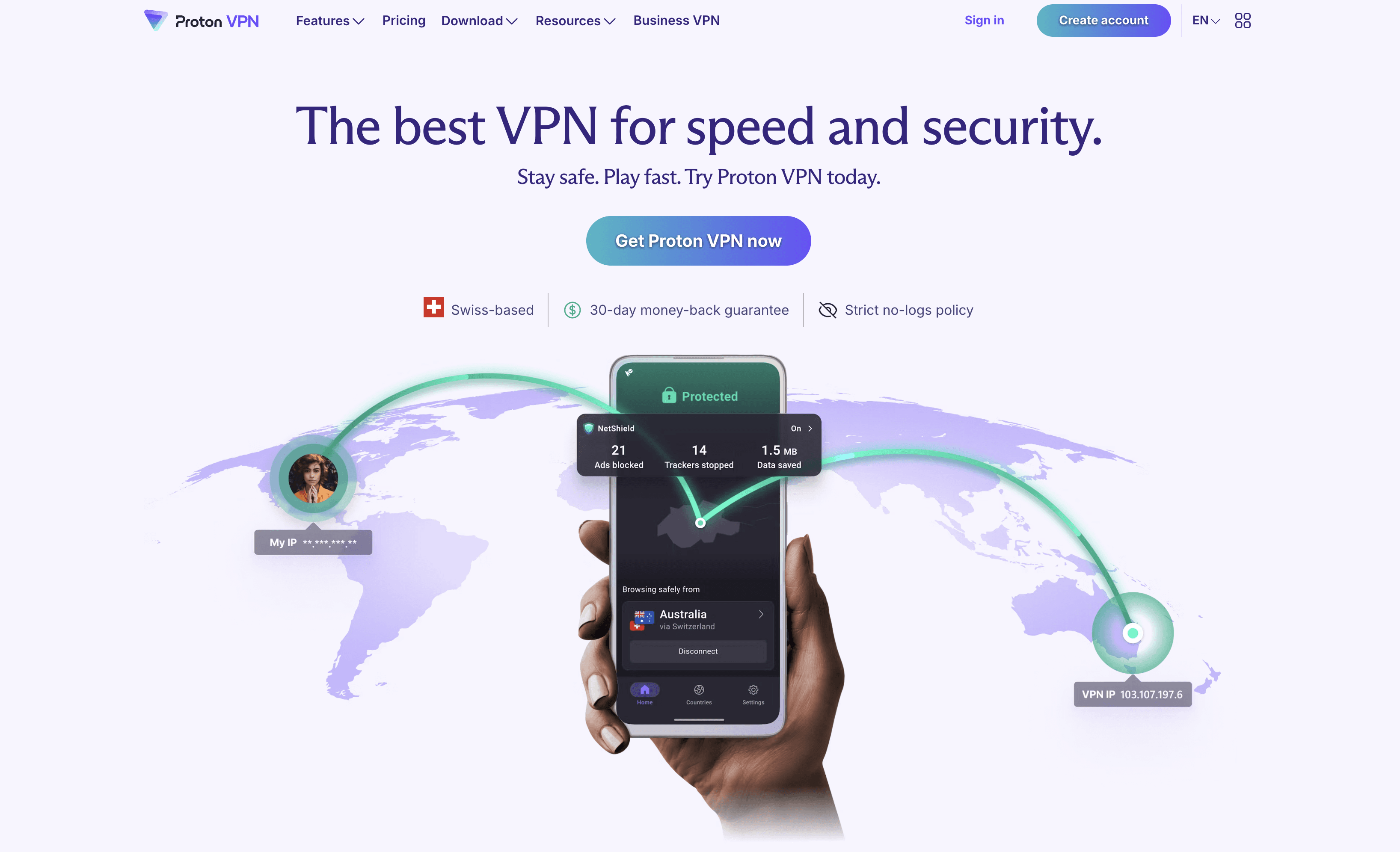
10 Alternatives to Proton VPN
1. Twingate
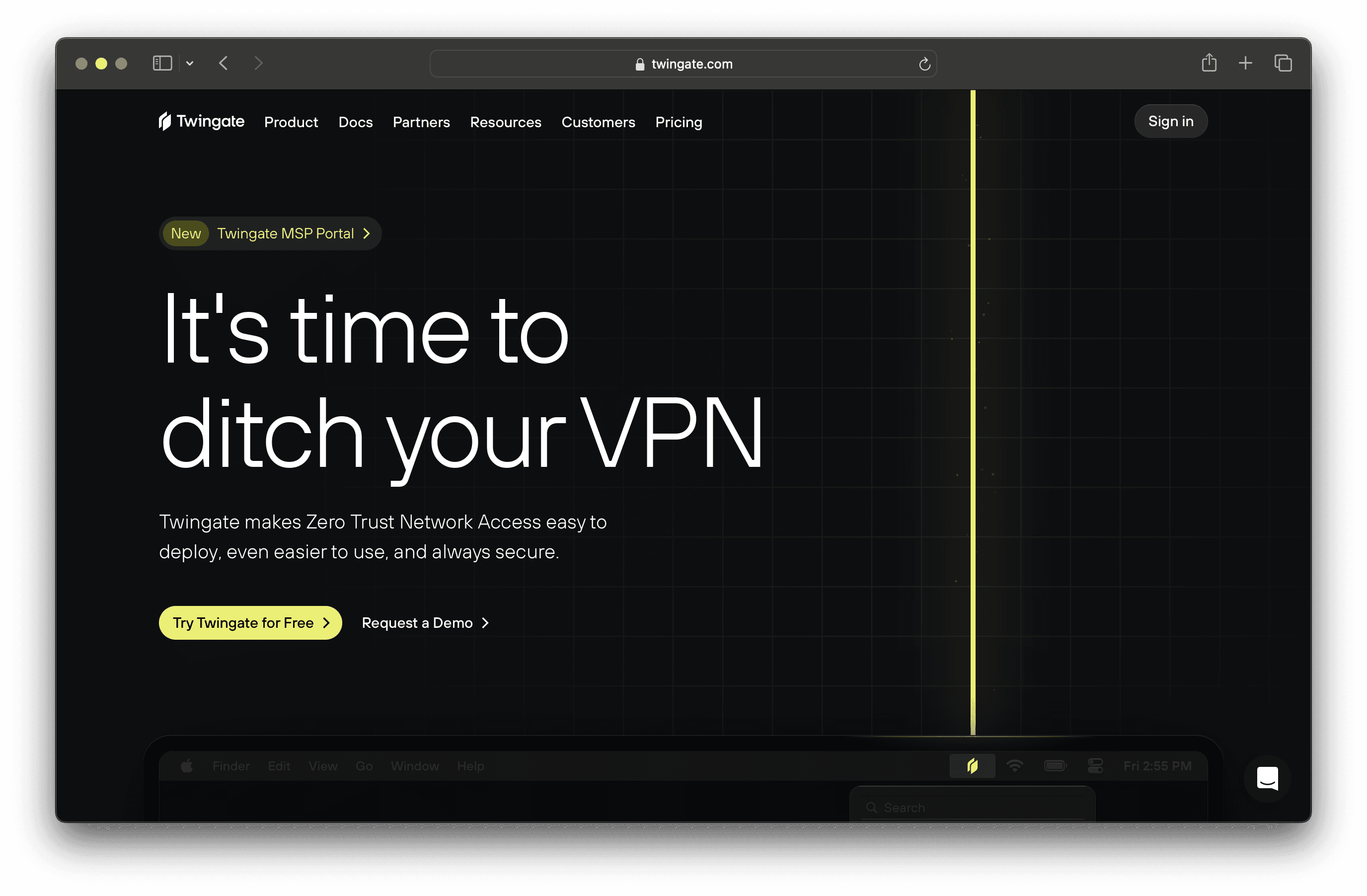
Twingate is a network security solution designed to replace traditional VPNs for remote access, offering a zero-trust security model and seamless deployment alongside existing infrastructure. With a focus on ease of use and scalability, Twingate aims to provide a secure and maintainable solution for businesses of all sizes.
Twingate Pricing
Starter: Free per user/month
Teams: $6 per user/month (monthly), $5 per user/month (yearly)
Business: $12 per user/month (monthly), $10 per user/month (yearly)
Enterprise: Custom pricing
Twingate Reviews
Twingate has an overall rating of 4.7 out of 5 stars based on 63 reviews. Users praise its ease of use, security, and performance. Check out more of our reviews here!
Pros and Cons of Twingate
Pros:
Hardware Free: Twingate eliminates the need for complex hardware deployments, making it easier to manage and maintain.
Zero Trust Security: Implements least privilege access and prevents lateral network traffic, enhancing overall security.
Ease of Deployment: Can be set up in minutes, significantly reducing the time and effort compared to traditional VPNs.
Cons:
Complexity for Some Users: Advanced features might be overwhelming for less tech-savvy users or simpler use cases.
Initial Setup: Some users may find the initial configuration challenging, especially if unfamiliar with zero trust principles.
Dependency on Internet: As a cloud-based solution, its performance relies on stable internet connectivity, which can be a concern in some areas.
2. Netbird
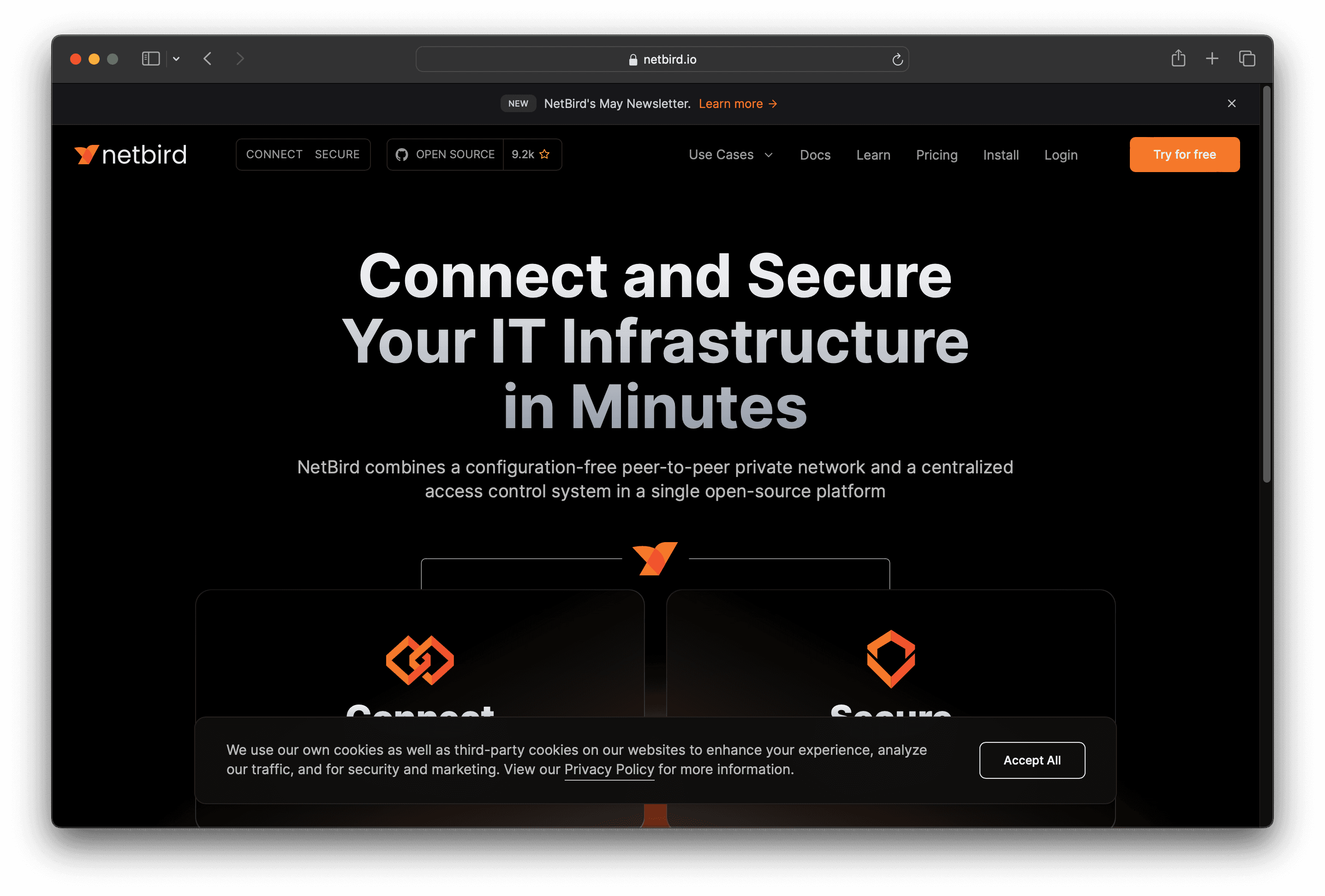
NetBird is a platform that offers a configuration-free peer-to-peer private network combined with centralized access control. It leverages WireGuard® for high-performance networking and provides enterprise-grade security, making it an ideal solution for businesses seeking a secure and efficient way to manage their IT infrastructure.
Netbird Pricing
Free: $0 per user/month
Team: $5 per user/month
Business: $12 per user/month
Enterprise: Custom pricing
MSP: Custom pricing
Self-hosted NetBird: Free
Netbird Reviews
NetBird has an overall rating of 5.0 out of 5 stars based on 1 review. Users praise its ease of installation and open-source nature. Check out more of our reviews here!
Pros and Cons ofNetbird
Pros:
High-Performance Network: Utilizes WireGuard® for fast, efficient peer-to-peer connections, ensuring minimal latency and high throughput.
Enterprise-Grade Security: Delivers robust security features at a lower cost, making it accessible for businesses of all sizes.
Open-Source Platform: Transparency and community-driven improvements foster trust and continuous enhancement.
Cons:
Dependency on WireGuard®: Any issues with WireGuard® could directly impact NetBird's performance and reliability.
Open-Source Nature: Some organizations may prefer proprietary solutions with dedicated support over open-source alternatives.
New Product: Lacks the maturity and extensive user base of more established solutions, which might affect long-term reliability.
3. Cloudflare
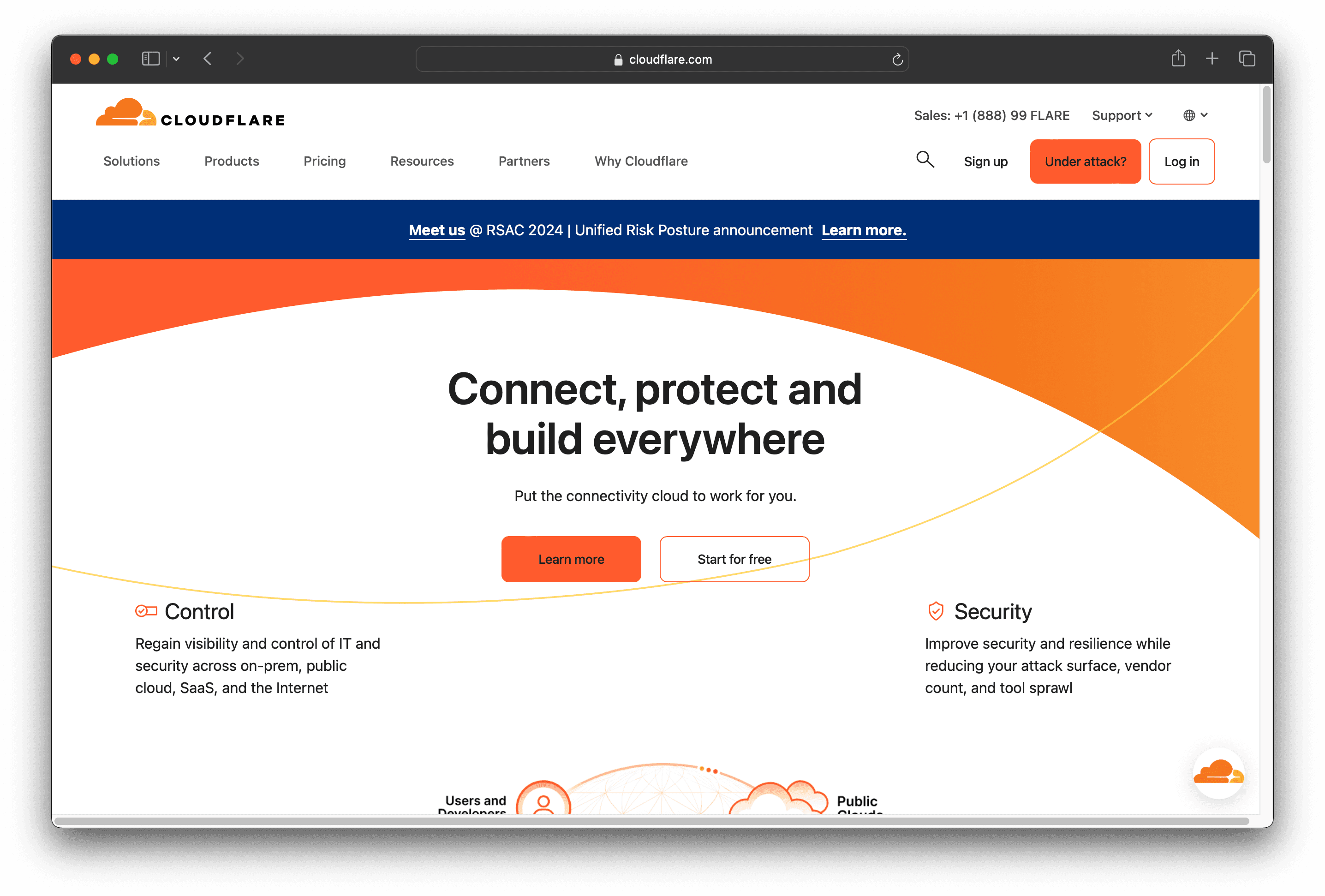
Cloudflare is a comprehensive platform designed to enhance connectivity, security, and performance for businesses. It offers a range of services, including Secure Access Service Edge (SASE) and Security Service Edge (SSE), to protect and optimize digital infrastructure. Cloudflare aims to provide scalable and efficient solutions for enterprises of all sizes.
Cloudflare Pricing
Free: $0/month
Pro: $20/month (annually) or $25/month (monthly)
Business: $200/month (annually) or $250/month (monthly)
Enterprise: Custom pricing
Cloudflare Reviews
Cloudflare has an overall rating of 4.5 out of 5 stars based on 528 reviews. Users praise its fast, reliable, and secure DNS service. Check out more of our reviews here!
Pros and Cons of Cloudflare
Pros:
Security: Cloudflare significantly enhances security, reducing the attack surface and providing robust protection against threats.
Ease of Use: Users find Cloudflare straightforward to set up and manage, making it accessible even for those with limited technical expertise.
Speed: Cloudflare accelerates application and network performance, ensuring fast and reliable access to online resources.
Cons:
Complex User Interface: The extensive range of features can be overwhelming, making the interface difficult to navigate for some users.
Expensive: While basic services are affordable, advanced features and enterprise plans can be costly, impacting budget-conscious organizations.
Difficult Configuration: Initial setup and configuration can be challenging, especially for users unfamiliar with Cloudflare's comprehensive security features.
4. Watchguard
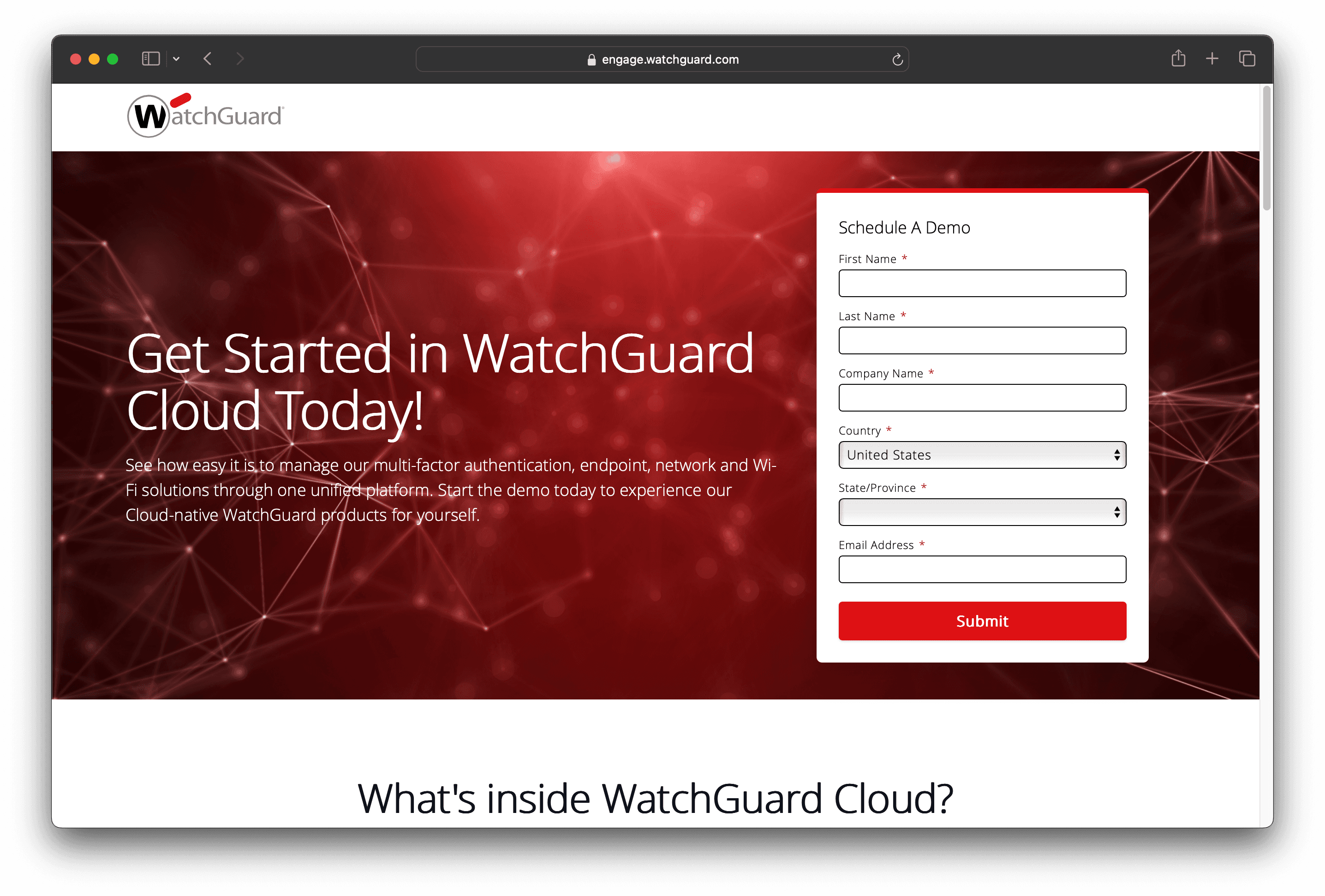
WatchGuard provides a Unified Security Platform® that integrates network, endpoint, identity, and Wi-Fi security. Designed for simplicity and scalability, it offers AI-driven threat detection, centralized management, and zero-touch deployment, making it an ideal choice for businesses and service providers seeking comprehensive cybersecurity solutions.
Watchguard Pricing
Watchguard's pricing is not public. Contact their support for more info.
Watchguard Reviews
WatchGuard has an overall rating of 4.7 out of 5 stars based on 258 reviews. Users praise its ease of use and robust security features. Check out more of our reviews here!
Pros and Cons of Watchguard
Pros:
Comprehensive Security: Unified platform integrates network, endpoint, identity, and Wi-Fi security, simplifying management.
AI-Driven Threat Detection: Advanced AI capabilities enhance threat detection and response, providing robust protection.
Centralized Management: WatchGuard Cloud offers centralized control, improving visibility and simplifying administration.
Cons:
Complex Setup: Initial installation and configuration can be challenging, often requiring professional assistance.
Costly for Small Businesses: Advanced features and enterprise-grade solutions may be expensive for smaller organizations.
Learning Curve: Significant time and training needed to fully utilize the platform's advanced features.
5. Namecheap VPN Service
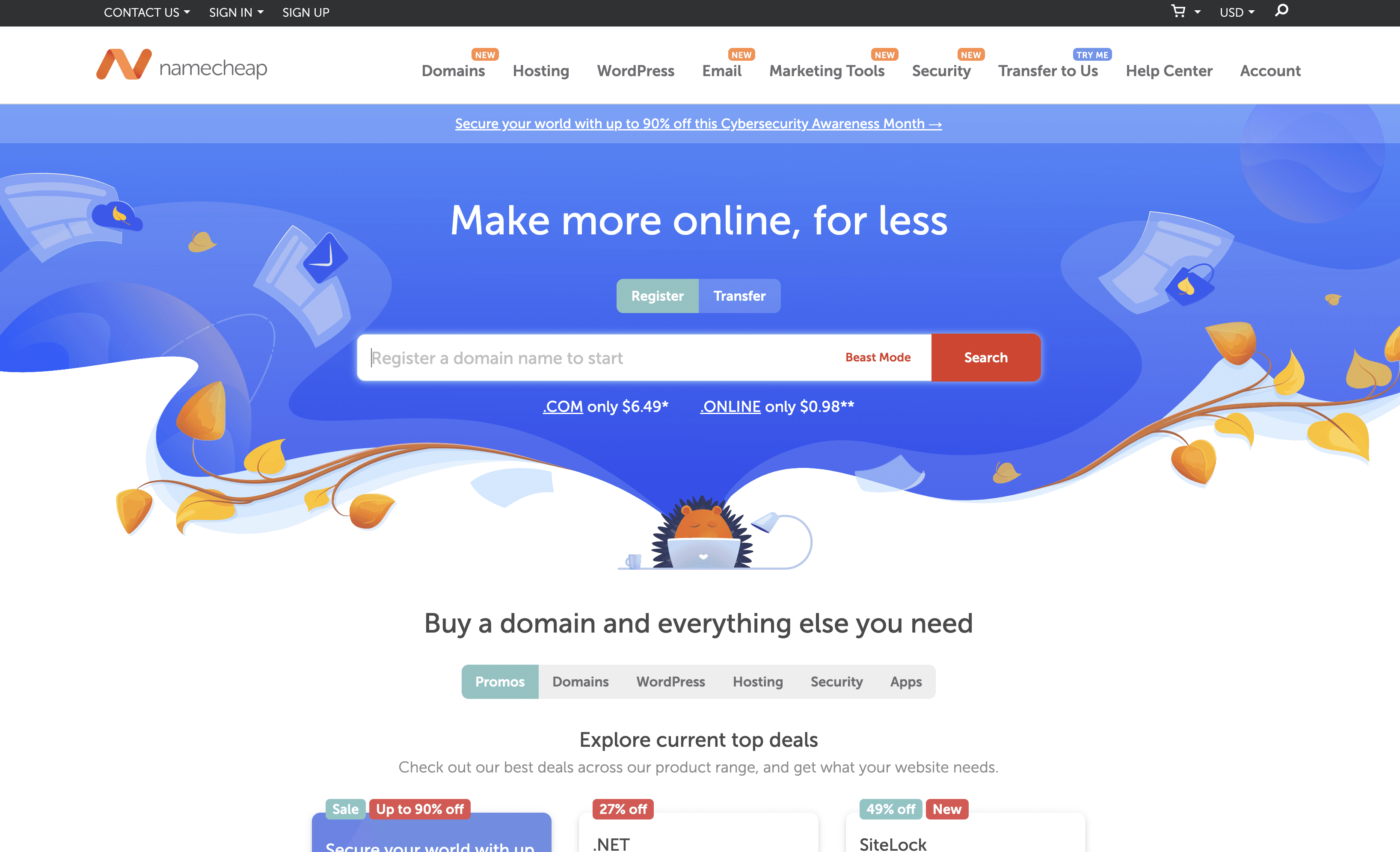
Namecheap VPN Service offers secure and private internet access with easy-to-use applications for various devices. It focuses on providing high-speed connections, robust encryption, and a no-logs policy, ensuring user privacy and security. Ideal for both personal and business use, it aims to deliver reliable and affordable VPN solutions.
Namecheap VPN Service Pricing
Monthly: $1.88
Yearly: $12.88
Two-Year: $24.88
Namecheap VPN Service Reviews
Namecheap VPN Service has an overall rating of 4.4 out of 5 stars based on 11 reviews. Users appreciate its high speed and unlimited downloads. Check out more of our reviews here!
Pros and Cons of Namecheap VPN Service
Pros:
High-Speed Connections: Users appreciate the high internet speed, with minimal bandwidth reduction, ensuring a smooth browsing experience.
Robust Security: The service is noted for its strong security features, including military-grade encryption, safeguarding user data.
Unlimited Downloads: The VPN offers superfast speeds and unlimited downloads, making it ideal for heavy internet users.
Cons:
Insufficient Guidance: Some users find the guidance and support for first-time users insufficient, leading to a steeper learning curve.
Server Instability: Occasional issues with server stability and connection failures can disrupt the user experience.
Data Privacy Concerns: Unclear data collection policies cause concerns about data privacy among some users.
6. IVPN
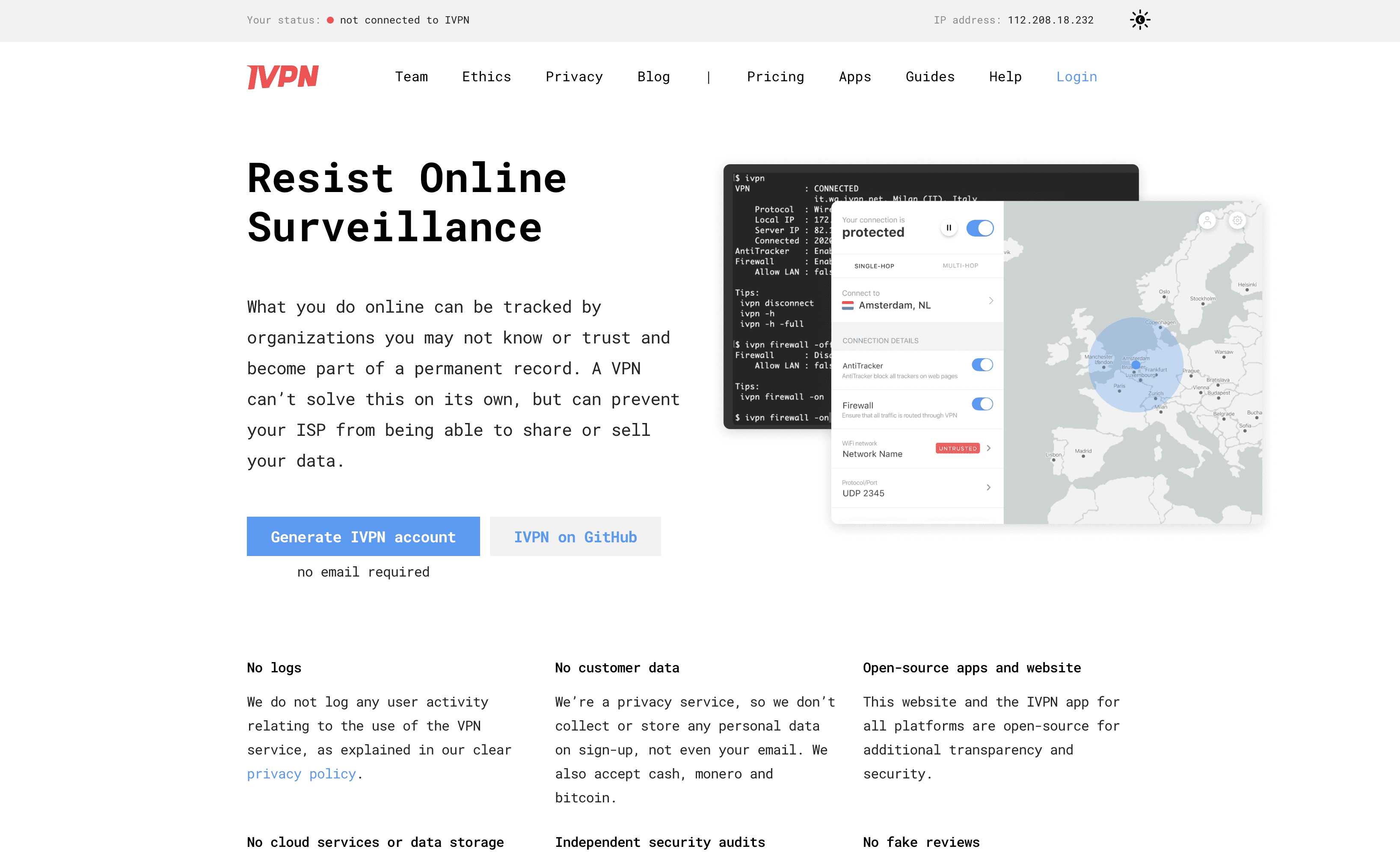
IVPN is a VPN service focused on privacy and security, designed to prevent ISPs from monitoring and selling user data. It offers no-logs policies, open-source apps, and independent security audits, ensuring transparency and robust protection. IVPN aims to provide a straightforward and secure online experience for all users.
IVPN Pricing
IVPN Standard:
1 Week: $2
1 Month: $6
1 Year: $60
2 Years: $100
3 Years: $140
IVPN Pro:
1 Week: $4
1 Month: $10
1 Year: $100
2 Years: $160
3 Years: $220
IVPN Reviews
IVPN has an overall rating of 4.2 out of 5 stars based on 12 reviews. Users appreciate its easy-to-use interface and strong privacy focus. Check out more of our reviews here!
Pros and Cons of IVPN
Pros:
IVPN's no-logs policy ensures that no user activity is recorded, enhancing privacy and security.
Open-source apps and regular independent security audits provide transparency and trustworthiness.
Self-hosted servers eliminate reliance on third-party cloud services, ensuring data control.
Cons:
IVPN's higher subscription fees may be a barrier for budget-conscious users.
Manual server switching can be inconvenient, requiring users to disconnect before connecting to another server.
Limited server count compared to competitors may affect connection options and performance.
7. Perimeter 81
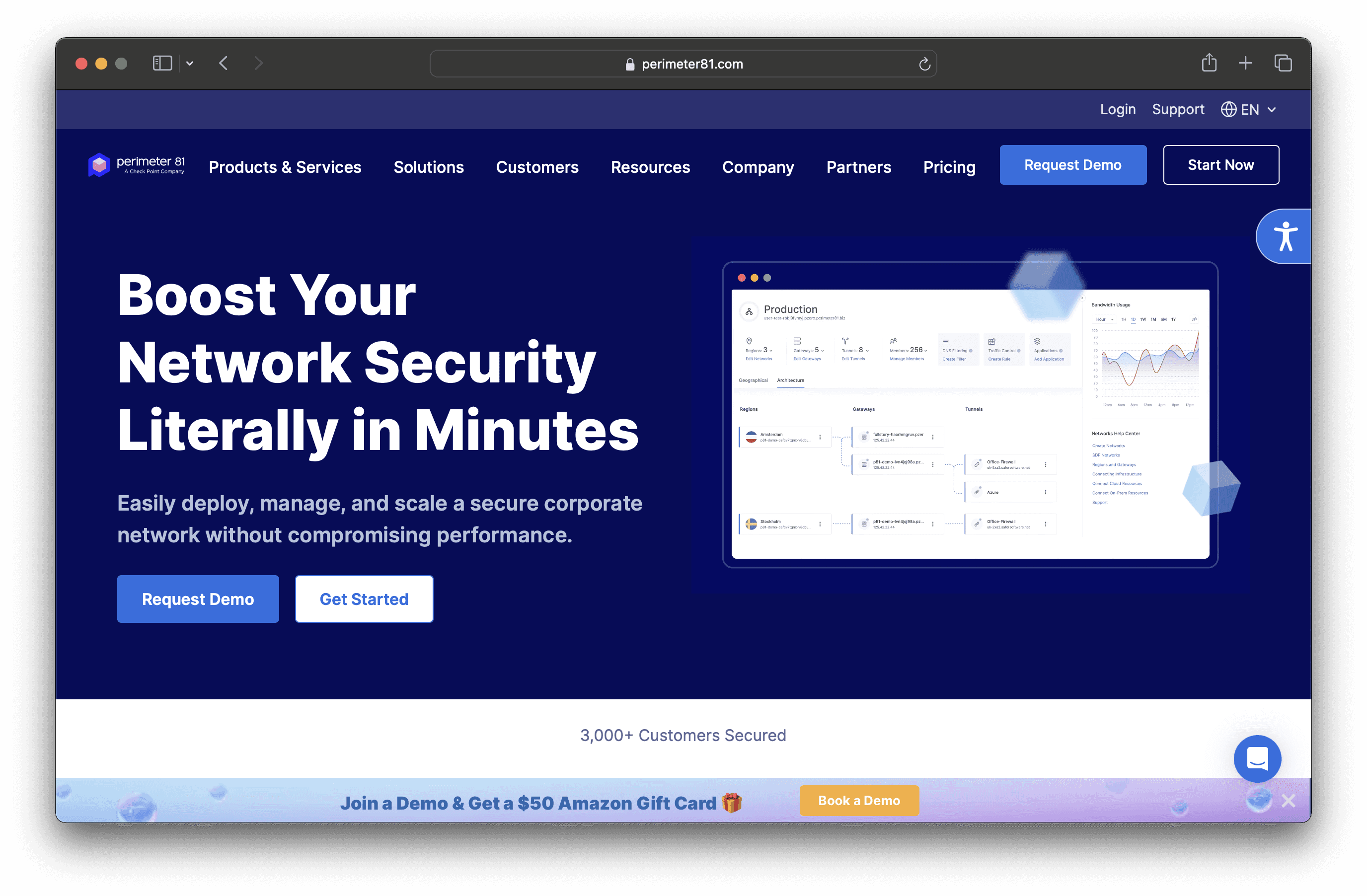
Perimeter 81 is a network security solution that offers a zero-trust security model, designed to replace traditional VPNs for remote access. It provides seamless deployment, robust protection, and ease of use, making it an ideal choice for businesses of all sizes seeking secure and scalable network access.
Perimeter 81 Pricing
Essentials: +$50/mo per gateway, minimum 10 users
Premium: +$50/mo per gateway, minimum 10 users
Premium Plus: +$50/mo per gateway, minimum 20 users
Enterprise: Custom pricing, minimum 50 users
Perimeter 81 Reviews
Perimeter 81 has an overall rating of 4.6 out of 5 stars based on 120 reviews. Users praise its seamless deployment and robust protection. Check out more of our reviews here!
Pros and Cons of Perimeter 81
Pros:
Robust Protection: Enterprise-grade security ensures private and internet access is safeguarded against threats.
Quick Deployment: Secure your network in under an hour, significantly faster than traditional solutions.
Cost-Effective: Eliminates hardware and maintenance costs, reducing overall expenses.
Cons:
Complexity for Non-Technical Users: Initial setup may be challenging without technical assistance.
Dependence on Internet Connectivity: Performance relies on stable internet, which can be a limitation.
Potential Costs: Subscription fees might be a consideration for budget-conscious businesses.
8. SaferVPN
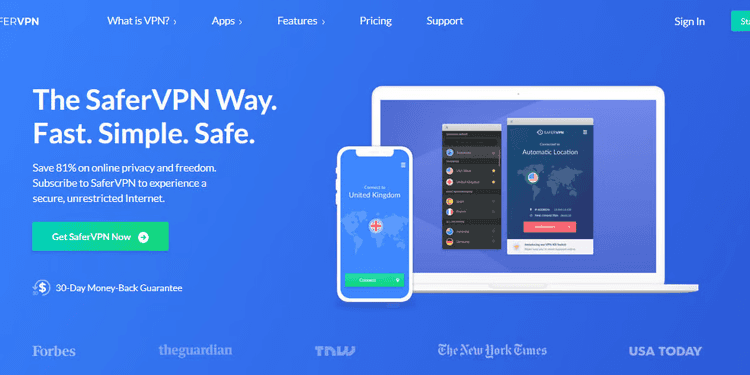
SaferVPN is a VPN service designed to provide secure and private internet access. It offers high-speed connections, robust encryption, and a user-friendly interface, making it ideal for both personal and business use. SaferVPN aims to deliver reliable and affordable VPN solutions for users worldwide.
SaferVPN Pricing
Monthly: $12.95
Yearly: $65.88
Three-Year: $89.88
SaferVPN Reviews
SaferVPN has an overall rating of 4.3 out of 5 stars based on 60 reviews. Users appreciate its simple interface and reliable security. Check out more of our reviews here!
Pros and Cons of SaferVPN
Pros:
Ease of Use: SaferVPN's intuitive interface makes it accessible for users of all technical levels, ensuring a smooth experience.
Customer Support: Responsive and helpful customer service enhances user satisfaction, addressing issues promptly.
Privacy Protection: Strong encryption and no-logs policy ensure user data remains private and secure.
Cons:
Slow Speed: Some users report reduced internet speeds, affecting streaming and browsing performance.
Expensive: Higher subscription costs may deter budget-conscious users from choosing SaferVPN.
Limited Location Options: Fewer server locations compared to competitors can limit connection choices.
9. Azure VPN Gateway
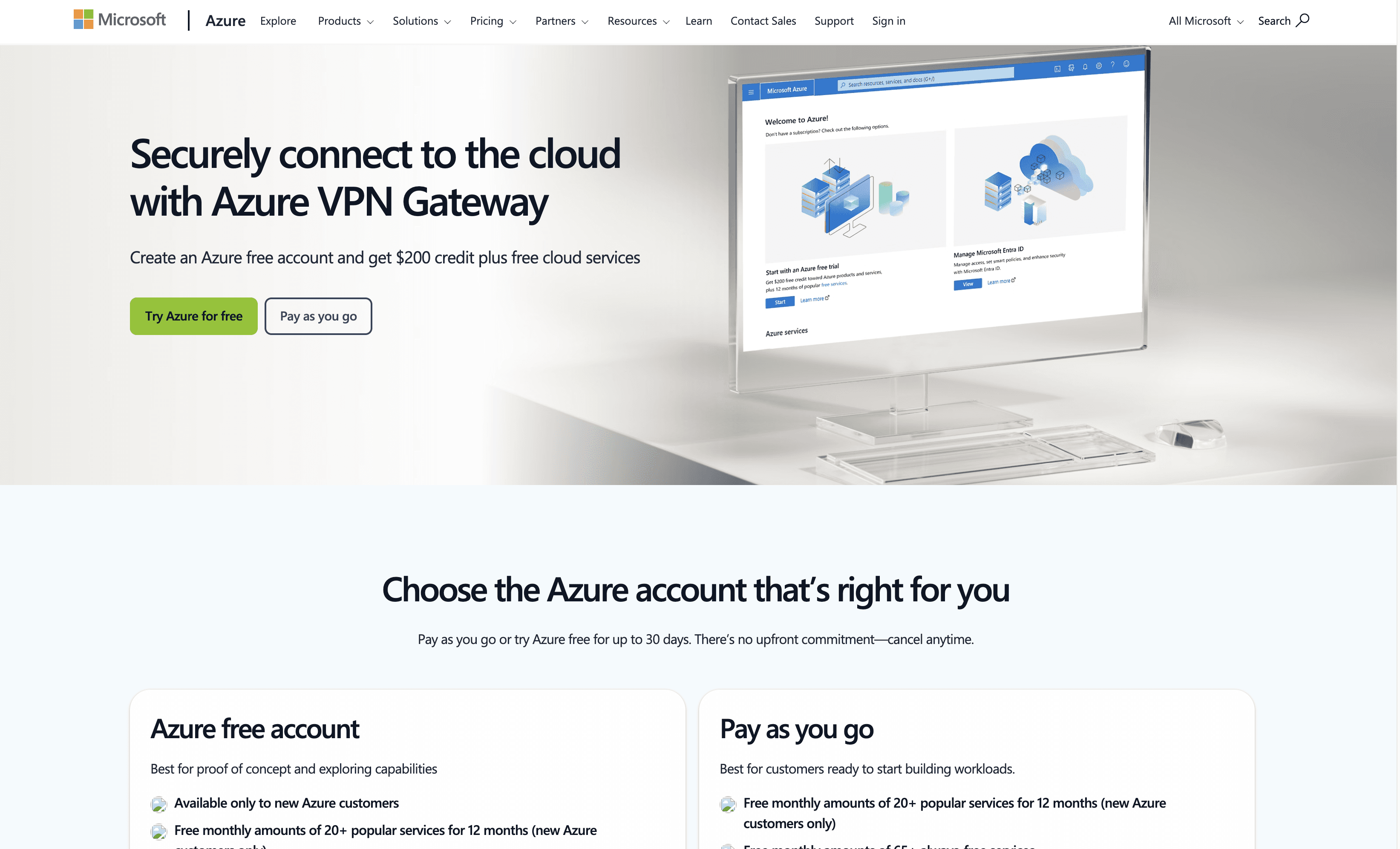
Azure VPN Gateway is a service that enables secure and reliable VPN connections to Microsoft Azure. It offers seamless integration with other Azure services, ensuring a straightforward and scalable solution for businesses. Designed for ease of use, it provides robust security and high performance for cloud connectivity.
Azure VPN Gateway Pricing
Azure Free Account: $200 credit for 30 days
Pay as You Go: Pay only for what you use
Azure VPN Gateway Reviews
Azure VPN Gateway has an overall rating of 4.1 out of 5 stars based on 21 reviews. Users appreciate its ease of setup and robust security. Check out more of our reviews here!
Pros and Cons of Azure VPN Gateway
Pros:
Secure Connection: Ensures secure cloud connections using industry-standard protocols like IPsec and IKE.
Ease of Setup: Users find it straightforward to set up and configure, minimizing deployment time.
Reliability: Known for its reliability and minimal downtime, ensuring consistent performance.
Cons:
Certificate Generation: The process is time-consuming and considered outdated by some users.
Cost: Some users find the service expensive, impacting budget-conscious organizations.
Implementation Time: Can take time to implement, which might be a drawback for some users.
10. ClearVPN
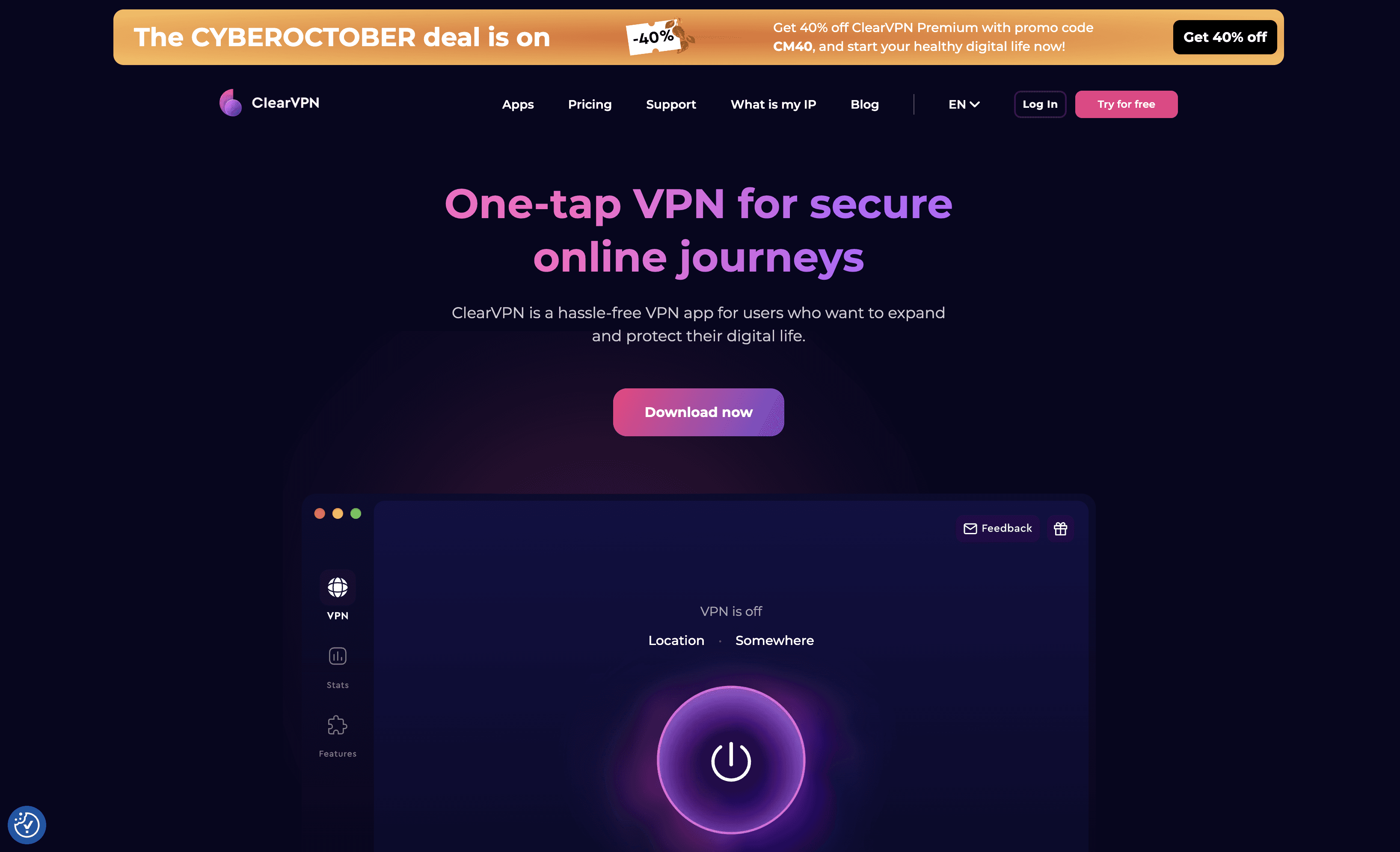
ClearVPN is a VPN service designed to enhance online privacy and security with a simple, one-tap solution. It offers an intuitive interface, multiple VPN protocols, and fast servers, making it accessible for users of all technical levels. ClearVPN aims to provide a secure and seamless online experience.
ClearVPN Pricing
1 Month Plan: $9.99 per month
1 Year Plan: $3.75 per month, billed as $44.99 annually
ClearVPN Reviews
ClearVPN has an overall rating of 4.3 out of 5 stars based on 10 reviews. Users appreciate its ease of use and fast speeds. Check out more of our reviews here!
Pros and Cons of ClearVPN
Pros:
Ease of Use: ClearVPN's one-tap connection simplifies the process, making it accessible for all users.
Enhanced Security: Multiple VPN protocols and high-level encryption ensure robust protection for your data.
Fast Servers: Optimized servers in 45+ countries provide high-speed connections for seamless browsing.
Cons:
Limited Features: Some users find the feature set lacking compared to other VPN services.
Slow Speed: Occasional slowdowns can affect streaming and browsing performance.
Website Blocking: Certain websites may still be inaccessible, limiting the VPN's effectiveness.
Looking to secure your technical infrastructure?
Twingate offers granular access controls and deployment automations to protect your VPC environment. By leveraging Zero Trust security tools, Twingate ensures that private resources and internet traffic remain secure in the modern work landscape. Try Twingate for Free today!
Rapidly implement a modern Zero Trust network that is more secure and maintainable than VPNs.
The Best 10 Alternatives to Proton VPN (+ Pricing & Reviews)
Twingate Team
•
•
Jul 27, 2024

Proton VPN provides secure internet connections through encrypted VPN tunnels, ensuring privacy by not logging user activity and allowing access to restricted online content. While it offers robust features, it might not be the choice for everyone. This article explores the benefits and limitations of using Proton VPN.

10 Alternatives to Proton VPN
1. Twingate

Twingate is a network security solution designed to replace traditional VPNs for remote access, offering a zero-trust security model and seamless deployment alongside existing infrastructure. With a focus on ease of use and scalability, Twingate aims to provide a secure and maintainable solution for businesses of all sizes.
Twingate Pricing
Starter: Free per user/month
Teams: $6 per user/month (monthly), $5 per user/month (yearly)
Business: $12 per user/month (monthly), $10 per user/month (yearly)
Enterprise: Custom pricing
Twingate Reviews
Twingate has an overall rating of 4.7 out of 5 stars based on 63 reviews. Users praise its ease of use, security, and performance. Check out more of our reviews here!
Pros and Cons of Twingate
Pros:
Hardware Free: Twingate eliminates the need for complex hardware deployments, making it easier to manage and maintain.
Zero Trust Security: Implements least privilege access and prevents lateral network traffic, enhancing overall security.
Ease of Deployment: Can be set up in minutes, significantly reducing the time and effort compared to traditional VPNs.
Cons:
Complexity for Some Users: Advanced features might be overwhelming for less tech-savvy users or simpler use cases.
Initial Setup: Some users may find the initial configuration challenging, especially if unfamiliar with zero trust principles.
Dependency on Internet: As a cloud-based solution, its performance relies on stable internet connectivity, which can be a concern in some areas.
2. Netbird

NetBird is a platform that offers a configuration-free peer-to-peer private network combined with centralized access control. It leverages WireGuard® for high-performance networking and provides enterprise-grade security, making it an ideal solution for businesses seeking a secure and efficient way to manage their IT infrastructure.
Netbird Pricing
Free: $0 per user/month
Team: $5 per user/month
Business: $12 per user/month
Enterprise: Custom pricing
MSP: Custom pricing
Self-hosted NetBird: Free
Netbird Reviews
NetBird has an overall rating of 5.0 out of 5 stars based on 1 review. Users praise its ease of installation and open-source nature. Check out more of our reviews here!
Pros and Cons ofNetbird
Pros:
High-Performance Network: Utilizes WireGuard® for fast, efficient peer-to-peer connections, ensuring minimal latency and high throughput.
Enterprise-Grade Security: Delivers robust security features at a lower cost, making it accessible for businesses of all sizes.
Open-Source Platform: Transparency and community-driven improvements foster trust and continuous enhancement.
Cons:
Dependency on WireGuard®: Any issues with WireGuard® could directly impact NetBird's performance and reliability.
Open-Source Nature: Some organizations may prefer proprietary solutions with dedicated support over open-source alternatives.
New Product: Lacks the maturity and extensive user base of more established solutions, which might affect long-term reliability.
3. Cloudflare

Cloudflare is a comprehensive platform designed to enhance connectivity, security, and performance for businesses. It offers a range of services, including Secure Access Service Edge (SASE) and Security Service Edge (SSE), to protect and optimize digital infrastructure. Cloudflare aims to provide scalable and efficient solutions for enterprises of all sizes.
Cloudflare Pricing
Free: $0/month
Pro: $20/month (annually) or $25/month (monthly)
Business: $200/month (annually) or $250/month (monthly)
Enterprise: Custom pricing
Cloudflare Reviews
Cloudflare has an overall rating of 4.5 out of 5 stars based on 528 reviews. Users praise its fast, reliable, and secure DNS service. Check out more of our reviews here!
Pros and Cons of Cloudflare
Pros:
Security: Cloudflare significantly enhances security, reducing the attack surface and providing robust protection against threats.
Ease of Use: Users find Cloudflare straightforward to set up and manage, making it accessible even for those with limited technical expertise.
Speed: Cloudflare accelerates application and network performance, ensuring fast and reliable access to online resources.
Cons:
Complex User Interface: The extensive range of features can be overwhelming, making the interface difficult to navigate for some users.
Expensive: While basic services are affordable, advanced features and enterprise plans can be costly, impacting budget-conscious organizations.
Difficult Configuration: Initial setup and configuration can be challenging, especially for users unfamiliar with Cloudflare's comprehensive security features.
4. Watchguard

WatchGuard provides a Unified Security Platform® that integrates network, endpoint, identity, and Wi-Fi security. Designed for simplicity and scalability, it offers AI-driven threat detection, centralized management, and zero-touch deployment, making it an ideal choice for businesses and service providers seeking comprehensive cybersecurity solutions.
Watchguard Pricing
Watchguard's pricing is not public. Contact their support for more info.
Watchguard Reviews
WatchGuard has an overall rating of 4.7 out of 5 stars based on 258 reviews. Users praise its ease of use and robust security features. Check out more of our reviews here!
Pros and Cons of Watchguard
Pros:
Comprehensive Security: Unified platform integrates network, endpoint, identity, and Wi-Fi security, simplifying management.
AI-Driven Threat Detection: Advanced AI capabilities enhance threat detection and response, providing robust protection.
Centralized Management: WatchGuard Cloud offers centralized control, improving visibility and simplifying administration.
Cons:
Complex Setup: Initial installation and configuration can be challenging, often requiring professional assistance.
Costly for Small Businesses: Advanced features and enterprise-grade solutions may be expensive for smaller organizations.
Learning Curve: Significant time and training needed to fully utilize the platform's advanced features.
5. Namecheap VPN Service

Namecheap VPN Service offers secure and private internet access with easy-to-use applications for various devices. It focuses on providing high-speed connections, robust encryption, and a no-logs policy, ensuring user privacy and security. Ideal for both personal and business use, it aims to deliver reliable and affordable VPN solutions.
Namecheap VPN Service Pricing
Monthly: $1.88
Yearly: $12.88
Two-Year: $24.88
Namecheap VPN Service Reviews
Namecheap VPN Service has an overall rating of 4.4 out of 5 stars based on 11 reviews. Users appreciate its high speed and unlimited downloads. Check out more of our reviews here!
Pros and Cons of Namecheap VPN Service
Pros:
High-Speed Connections: Users appreciate the high internet speed, with minimal bandwidth reduction, ensuring a smooth browsing experience.
Robust Security: The service is noted for its strong security features, including military-grade encryption, safeguarding user data.
Unlimited Downloads: The VPN offers superfast speeds and unlimited downloads, making it ideal for heavy internet users.
Cons:
Insufficient Guidance: Some users find the guidance and support for first-time users insufficient, leading to a steeper learning curve.
Server Instability: Occasional issues with server stability and connection failures can disrupt the user experience.
Data Privacy Concerns: Unclear data collection policies cause concerns about data privacy among some users.
6. IVPN

IVPN is a VPN service focused on privacy and security, designed to prevent ISPs from monitoring and selling user data. It offers no-logs policies, open-source apps, and independent security audits, ensuring transparency and robust protection. IVPN aims to provide a straightforward and secure online experience for all users.
IVPN Pricing
IVPN Standard:
1 Week: $2
1 Month: $6
1 Year: $60
2 Years: $100
3 Years: $140
IVPN Pro:
1 Week: $4
1 Month: $10
1 Year: $100
2 Years: $160
3 Years: $220
IVPN Reviews
IVPN has an overall rating of 4.2 out of 5 stars based on 12 reviews. Users appreciate its easy-to-use interface and strong privacy focus. Check out more of our reviews here!
Pros and Cons of IVPN
Pros:
IVPN's no-logs policy ensures that no user activity is recorded, enhancing privacy and security.
Open-source apps and regular independent security audits provide transparency and trustworthiness.
Self-hosted servers eliminate reliance on third-party cloud services, ensuring data control.
Cons:
IVPN's higher subscription fees may be a barrier for budget-conscious users.
Manual server switching can be inconvenient, requiring users to disconnect before connecting to another server.
Limited server count compared to competitors may affect connection options and performance.
7. Perimeter 81

Perimeter 81 is a network security solution that offers a zero-trust security model, designed to replace traditional VPNs for remote access. It provides seamless deployment, robust protection, and ease of use, making it an ideal choice for businesses of all sizes seeking secure and scalable network access.
Perimeter 81 Pricing
Essentials: +$50/mo per gateway, minimum 10 users
Premium: +$50/mo per gateway, minimum 10 users
Premium Plus: +$50/mo per gateway, minimum 20 users
Enterprise: Custom pricing, minimum 50 users
Perimeter 81 Reviews
Perimeter 81 has an overall rating of 4.6 out of 5 stars based on 120 reviews. Users praise its seamless deployment and robust protection. Check out more of our reviews here!
Pros and Cons of Perimeter 81
Pros:
Robust Protection: Enterprise-grade security ensures private and internet access is safeguarded against threats.
Quick Deployment: Secure your network in under an hour, significantly faster than traditional solutions.
Cost-Effective: Eliminates hardware and maintenance costs, reducing overall expenses.
Cons:
Complexity for Non-Technical Users: Initial setup may be challenging without technical assistance.
Dependence on Internet Connectivity: Performance relies on stable internet, which can be a limitation.
Potential Costs: Subscription fees might be a consideration for budget-conscious businesses.
8. SaferVPN

SaferVPN is a VPN service designed to provide secure and private internet access. It offers high-speed connections, robust encryption, and a user-friendly interface, making it ideal for both personal and business use. SaferVPN aims to deliver reliable and affordable VPN solutions for users worldwide.
SaferVPN Pricing
Monthly: $12.95
Yearly: $65.88
Three-Year: $89.88
SaferVPN Reviews
SaferVPN has an overall rating of 4.3 out of 5 stars based on 60 reviews. Users appreciate its simple interface and reliable security. Check out more of our reviews here!
Pros and Cons of SaferVPN
Pros:
Ease of Use: SaferVPN's intuitive interface makes it accessible for users of all technical levels, ensuring a smooth experience.
Customer Support: Responsive and helpful customer service enhances user satisfaction, addressing issues promptly.
Privacy Protection: Strong encryption and no-logs policy ensure user data remains private and secure.
Cons:
Slow Speed: Some users report reduced internet speeds, affecting streaming and browsing performance.
Expensive: Higher subscription costs may deter budget-conscious users from choosing SaferVPN.
Limited Location Options: Fewer server locations compared to competitors can limit connection choices.
9. Azure VPN Gateway

Azure VPN Gateway is a service that enables secure and reliable VPN connections to Microsoft Azure. It offers seamless integration with other Azure services, ensuring a straightforward and scalable solution for businesses. Designed for ease of use, it provides robust security and high performance for cloud connectivity.
Azure VPN Gateway Pricing
Azure Free Account: $200 credit for 30 days
Pay as You Go: Pay only for what you use
Azure VPN Gateway Reviews
Azure VPN Gateway has an overall rating of 4.1 out of 5 stars based on 21 reviews. Users appreciate its ease of setup and robust security. Check out more of our reviews here!
Pros and Cons of Azure VPN Gateway
Pros:
Secure Connection: Ensures secure cloud connections using industry-standard protocols like IPsec and IKE.
Ease of Setup: Users find it straightforward to set up and configure, minimizing deployment time.
Reliability: Known for its reliability and minimal downtime, ensuring consistent performance.
Cons:
Certificate Generation: The process is time-consuming and considered outdated by some users.
Cost: Some users find the service expensive, impacting budget-conscious organizations.
Implementation Time: Can take time to implement, which might be a drawback for some users.
10. ClearVPN

ClearVPN is a VPN service designed to enhance online privacy and security with a simple, one-tap solution. It offers an intuitive interface, multiple VPN protocols, and fast servers, making it accessible for users of all technical levels. ClearVPN aims to provide a secure and seamless online experience.
ClearVPN Pricing
1 Month Plan: $9.99 per month
1 Year Plan: $3.75 per month, billed as $44.99 annually
ClearVPN Reviews
ClearVPN has an overall rating of 4.3 out of 5 stars based on 10 reviews. Users appreciate its ease of use and fast speeds. Check out more of our reviews here!
Pros and Cons of ClearVPN
Pros:
Ease of Use: ClearVPN's one-tap connection simplifies the process, making it accessible for all users.
Enhanced Security: Multiple VPN protocols and high-level encryption ensure robust protection for your data.
Fast Servers: Optimized servers in 45+ countries provide high-speed connections for seamless browsing.
Cons:
Limited Features: Some users find the feature set lacking compared to other VPN services.
Slow Speed: Occasional slowdowns can affect streaming and browsing performance.
Website Blocking: Certain websites may still be inaccessible, limiting the VPN's effectiveness.
Looking to secure your technical infrastructure?
Twingate offers granular access controls and deployment automations to protect your VPC environment. By leveraging Zero Trust security tools, Twingate ensures that private resources and internet traffic remain secure in the modern work landscape. Try Twingate for Free today!
Rapidly implement a modern Zero Trust network that is more secure and maintainable than VPNs.
The Best 10 Alternatives to Proton VPN (+ Pricing & Reviews)
Twingate Team
•
•
Jul 27, 2024

Proton VPN provides secure internet connections through encrypted VPN tunnels, ensuring privacy by not logging user activity and allowing access to restricted online content. While it offers robust features, it might not be the choice for everyone. This article explores the benefits and limitations of using Proton VPN.

10 Alternatives to Proton VPN
1. Twingate

Twingate is a network security solution designed to replace traditional VPNs for remote access, offering a zero-trust security model and seamless deployment alongside existing infrastructure. With a focus on ease of use and scalability, Twingate aims to provide a secure and maintainable solution for businesses of all sizes.
Twingate Pricing
Starter: Free per user/month
Teams: $6 per user/month (monthly), $5 per user/month (yearly)
Business: $12 per user/month (monthly), $10 per user/month (yearly)
Enterprise: Custom pricing
Twingate Reviews
Twingate has an overall rating of 4.7 out of 5 stars based on 63 reviews. Users praise its ease of use, security, and performance. Check out more of our reviews here!
Pros and Cons of Twingate
Pros:
Hardware Free: Twingate eliminates the need for complex hardware deployments, making it easier to manage and maintain.
Zero Trust Security: Implements least privilege access and prevents lateral network traffic, enhancing overall security.
Ease of Deployment: Can be set up in minutes, significantly reducing the time and effort compared to traditional VPNs.
Cons:
Complexity for Some Users: Advanced features might be overwhelming for less tech-savvy users or simpler use cases.
Initial Setup: Some users may find the initial configuration challenging, especially if unfamiliar with zero trust principles.
Dependency on Internet: As a cloud-based solution, its performance relies on stable internet connectivity, which can be a concern in some areas.
2. Netbird

NetBird is a platform that offers a configuration-free peer-to-peer private network combined with centralized access control. It leverages WireGuard® for high-performance networking and provides enterprise-grade security, making it an ideal solution for businesses seeking a secure and efficient way to manage their IT infrastructure.
Netbird Pricing
Free: $0 per user/month
Team: $5 per user/month
Business: $12 per user/month
Enterprise: Custom pricing
MSP: Custom pricing
Self-hosted NetBird: Free
Netbird Reviews
NetBird has an overall rating of 5.0 out of 5 stars based on 1 review. Users praise its ease of installation and open-source nature. Check out more of our reviews here!
Pros and Cons ofNetbird
Pros:
High-Performance Network: Utilizes WireGuard® for fast, efficient peer-to-peer connections, ensuring minimal latency and high throughput.
Enterprise-Grade Security: Delivers robust security features at a lower cost, making it accessible for businesses of all sizes.
Open-Source Platform: Transparency and community-driven improvements foster trust and continuous enhancement.
Cons:
Dependency on WireGuard®: Any issues with WireGuard® could directly impact NetBird's performance and reliability.
Open-Source Nature: Some organizations may prefer proprietary solutions with dedicated support over open-source alternatives.
New Product: Lacks the maturity and extensive user base of more established solutions, which might affect long-term reliability.
3. Cloudflare

Cloudflare is a comprehensive platform designed to enhance connectivity, security, and performance for businesses. It offers a range of services, including Secure Access Service Edge (SASE) and Security Service Edge (SSE), to protect and optimize digital infrastructure. Cloudflare aims to provide scalable and efficient solutions for enterprises of all sizes.
Cloudflare Pricing
Free: $0/month
Pro: $20/month (annually) or $25/month (monthly)
Business: $200/month (annually) or $250/month (monthly)
Enterprise: Custom pricing
Cloudflare Reviews
Cloudflare has an overall rating of 4.5 out of 5 stars based on 528 reviews. Users praise its fast, reliable, and secure DNS service. Check out more of our reviews here!
Pros and Cons of Cloudflare
Pros:
Security: Cloudflare significantly enhances security, reducing the attack surface and providing robust protection against threats.
Ease of Use: Users find Cloudflare straightforward to set up and manage, making it accessible even for those with limited technical expertise.
Speed: Cloudflare accelerates application and network performance, ensuring fast and reliable access to online resources.
Cons:
Complex User Interface: The extensive range of features can be overwhelming, making the interface difficult to navigate for some users.
Expensive: While basic services are affordable, advanced features and enterprise plans can be costly, impacting budget-conscious organizations.
Difficult Configuration: Initial setup and configuration can be challenging, especially for users unfamiliar with Cloudflare's comprehensive security features.
4. Watchguard

WatchGuard provides a Unified Security Platform® that integrates network, endpoint, identity, and Wi-Fi security. Designed for simplicity and scalability, it offers AI-driven threat detection, centralized management, and zero-touch deployment, making it an ideal choice for businesses and service providers seeking comprehensive cybersecurity solutions.
Watchguard Pricing
Watchguard's pricing is not public. Contact their support for more info.
Watchguard Reviews
WatchGuard has an overall rating of 4.7 out of 5 stars based on 258 reviews. Users praise its ease of use and robust security features. Check out more of our reviews here!
Pros and Cons of Watchguard
Pros:
Comprehensive Security: Unified platform integrates network, endpoint, identity, and Wi-Fi security, simplifying management.
AI-Driven Threat Detection: Advanced AI capabilities enhance threat detection and response, providing robust protection.
Centralized Management: WatchGuard Cloud offers centralized control, improving visibility and simplifying administration.
Cons:
Complex Setup: Initial installation and configuration can be challenging, often requiring professional assistance.
Costly for Small Businesses: Advanced features and enterprise-grade solutions may be expensive for smaller organizations.
Learning Curve: Significant time and training needed to fully utilize the platform's advanced features.
5. Namecheap VPN Service

Namecheap VPN Service offers secure and private internet access with easy-to-use applications for various devices. It focuses on providing high-speed connections, robust encryption, and a no-logs policy, ensuring user privacy and security. Ideal for both personal and business use, it aims to deliver reliable and affordable VPN solutions.
Namecheap VPN Service Pricing
Monthly: $1.88
Yearly: $12.88
Two-Year: $24.88
Namecheap VPN Service Reviews
Namecheap VPN Service has an overall rating of 4.4 out of 5 stars based on 11 reviews. Users appreciate its high speed and unlimited downloads. Check out more of our reviews here!
Pros and Cons of Namecheap VPN Service
Pros:
High-Speed Connections: Users appreciate the high internet speed, with minimal bandwidth reduction, ensuring a smooth browsing experience.
Robust Security: The service is noted for its strong security features, including military-grade encryption, safeguarding user data.
Unlimited Downloads: The VPN offers superfast speeds and unlimited downloads, making it ideal for heavy internet users.
Cons:
Insufficient Guidance: Some users find the guidance and support for first-time users insufficient, leading to a steeper learning curve.
Server Instability: Occasional issues with server stability and connection failures can disrupt the user experience.
Data Privacy Concerns: Unclear data collection policies cause concerns about data privacy among some users.
6. IVPN

IVPN is a VPN service focused on privacy and security, designed to prevent ISPs from monitoring and selling user data. It offers no-logs policies, open-source apps, and independent security audits, ensuring transparency and robust protection. IVPN aims to provide a straightforward and secure online experience for all users.
IVPN Pricing
IVPN Standard:
1 Week: $2
1 Month: $6
1 Year: $60
2 Years: $100
3 Years: $140
IVPN Pro:
1 Week: $4
1 Month: $10
1 Year: $100
2 Years: $160
3 Years: $220
IVPN Reviews
IVPN has an overall rating of 4.2 out of 5 stars based on 12 reviews. Users appreciate its easy-to-use interface and strong privacy focus. Check out more of our reviews here!
Pros and Cons of IVPN
Pros:
IVPN's no-logs policy ensures that no user activity is recorded, enhancing privacy and security.
Open-source apps and regular independent security audits provide transparency and trustworthiness.
Self-hosted servers eliminate reliance on third-party cloud services, ensuring data control.
Cons:
IVPN's higher subscription fees may be a barrier for budget-conscious users.
Manual server switching can be inconvenient, requiring users to disconnect before connecting to another server.
Limited server count compared to competitors may affect connection options and performance.
7. Perimeter 81

Perimeter 81 is a network security solution that offers a zero-trust security model, designed to replace traditional VPNs for remote access. It provides seamless deployment, robust protection, and ease of use, making it an ideal choice for businesses of all sizes seeking secure and scalable network access.
Perimeter 81 Pricing
Essentials: +$50/mo per gateway, minimum 10 users
Premium: +$50/mo per gateway, minimum 10 users
Premium Plus: +$50/mo per gateway, minimum 20 users
Enterprise: Custom pricing, minimum 50 users
Perimeter 81 Reviews
Perimeter 81 has an overall rating of 4.6 out of 5 stars based on 120 reviews. Users praise its seamless deployment and robust protection. Check out more of our reviews here!
Pros and Cons of Perimeter 81
Pros:
Robust Protection: Enterprise-grade security ensures private and internet access is safeguarded against threats.
Quick Deployment: Secure your network in under an hour, significantly faster than traditional solutions.
Cost-Effective: Eliminates hardware and maintenance costs, reducing overall expenses.
Cons:
Complexity for Non-Technical Users: Initial setup may be challenging without technical assistance.
Dependence on Internet Connectivity: Performance relies on stable internet, which can be a limitation.
Potential Costs: Subscription fees might be a consideration for budget-conscious businesses.
8. SaferVPN

SaferVPN is a VPN service designed to provide secure and private internet access. It offers high-speed connections, robust encryption, and a user-friendly interface, making it ideal for both personal and business use. SaferVPN aims to deliver reliable and affordable VPN solutions for users worldwide.
SaferVPN Pricing
Monthly: $12.95
Yearly: $65.88
Three-Year: $89.88
SaferVPN Reviews
SaferVPN has an overall rating of 4.3 out of 5 stars based on 60 reviews. Users appreciate its simple interface and reliable security. Check out more of our reviews here!
Pros and Cons of SaferVPN
Pros:
Ease of Use: SaferVPN's intuitive interface makes it accessible for users of all technical levels, ensuring a smooth experience.
Customer Support: Responsive and helpful customer service enhances user satisfaction, addressing issues promptly.
Privacy Protection: Strong encryption and no-logs policy ensure user data remains private and secure.
Cons:
Slow Speed: Some users report reduced internet speeds, affecting streaming and browsing performance.
Expensive: Higher subscription costs may deter budget-conscious users from choosing SaferVPN.
Limited Location Options: Fewer server locations compared to competitors can limit connection choices.
9. Azure VPN Gateway

Azure VPN Gateway is a service that enables secure and reliable VPN connections to Microsoft Azure. It offers seamless integration with other Azure services, ensuring a straightforward and scalable solution for businesses. Designed for ease of use, it provides robust security and high performance for cloud connectivity.
Azure VPN Gateway Pricing
Azure Free Account: $200 credit for 30 days
Pay as You Go: Pay only for what you use
Azure VPN Gateway Reviews
Azure VPN Gateway has an overall rating of 4.1 out of 5 stars based on 21 reviews. Users appreciate its ease of setup and robust security. Check out more of our reviews here!
Pros and Cons of Azure VPN Gateway
Pros:
Secure Connection: Ensures secure cloud connections using industry-standard protocols like IPsec and IKE.
Ease of Setup: Users find it straightforward to set up and configure, minimizing deployment time.
Reliability: Known for its reliability and minimal downtime, ensuring consistent performance.
Cons:
Certificate Generation: The process is time-consuming and considered outdated by some users.
Cost: Some users find the service expensive, impacting budget-conscious organizations.
Implementation Time: Can take time to implement, which might be a drawback for some users.
10. ClearVPN

ClearVPN is a VPN service designed to enhance online privacy and security with a simple, one-tap solution. It offers an intuitive interface, multiple VPN protocols, and fast servers, making it accessible for users of all technical levels. ClearVPN aims to provide a secure and seamless online experience.
ClearVPN Pricing
1 Month Plan: $9.99 per month
1 Year Plan: $3.75 per month, billed as $44.99 annually
ClearVPN Reviews
ClearVPN has an overall rating of 4.3 out of 5 stars based on 10 reviews. Users appreciate its ease of use and fast speeds. Check out more of our reviews here!
Pros and Cons of ClearVPN
Pros:
Ease of Use: ClearVPN's one-tap connection simplifies the process, making it accessible for all users.
Enhanced Security: Multiple VPN protocols and high-level encryption ensure robust protection for your data.
Fast Servers: Optimized servers in 45+ countries provide high-speed connections for seamless browsing.
Cons:
Limited Features: Some users find the feature set lacking compared to other VPN services.
Slow Speed: Occasional slowdowns can affect streaming and browsing performance.
Website Blocking: Certain websites may still be inaccessible, limiting the VPN's effectiveness.
Looking to secure your technical infrastructure?
Twingate offers granular access controls and deployment automations to protect your VPC environment. By leveraging Zero Trust security tools, Twingate ensures that private resources and internet traffic remain secure in the modern work landscape. Try Twingate for Free today!
Solutions
Solutions
The VPN replacement your workforce will love.
Solutions